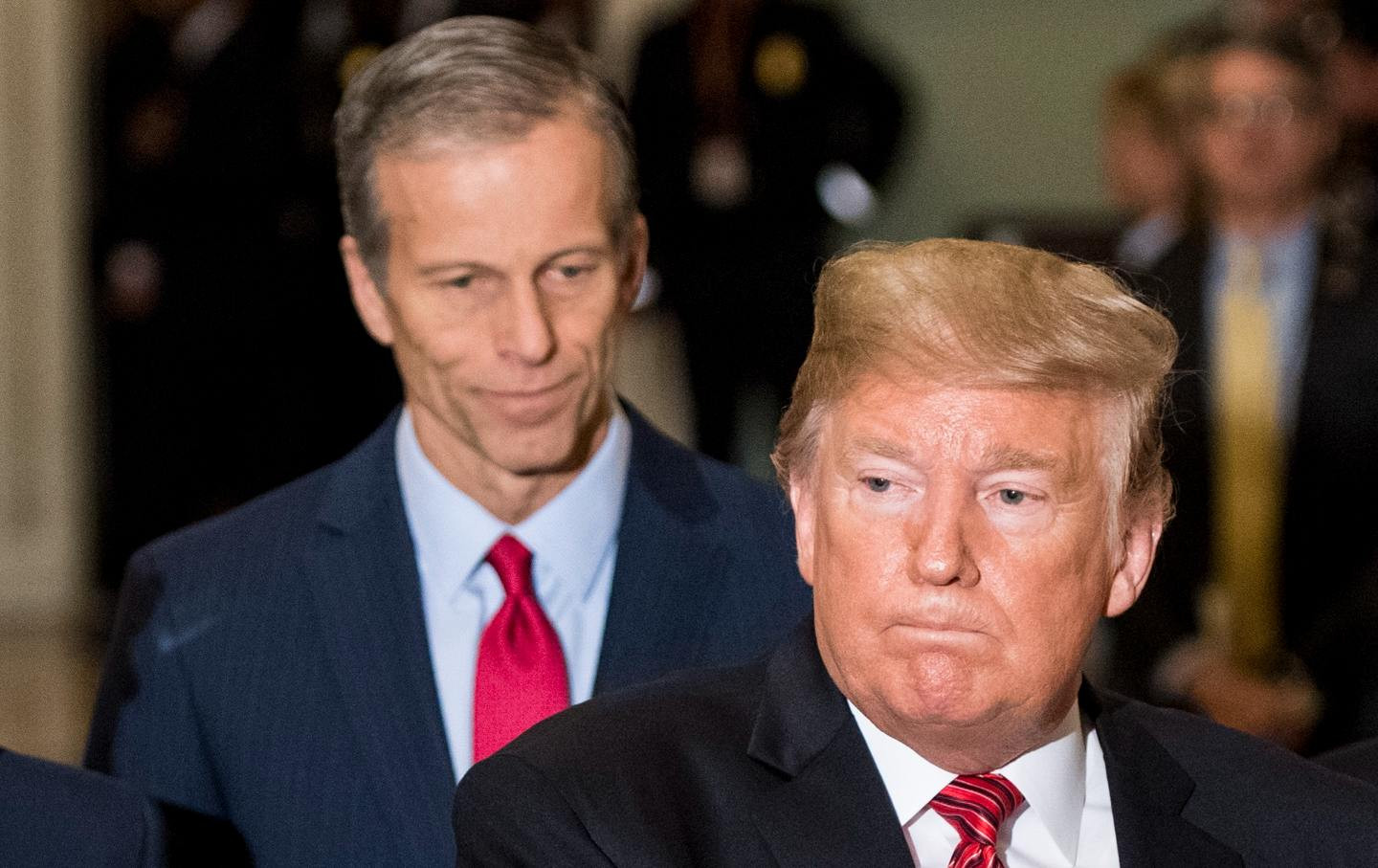Donald Trump’s grip on the Republican Party remains undeniable, even as figures within its ranks have, at times, dared to voice dissent. Among those voices, Senator John Thune of South Dakota stands out, particularly now as he assumes the critical role of Senate Majority Leader. This position, in a second Trump presidential term, sets the stage for a compelling political narrative: Can a leader who once openly challenged Trump’s actions now effectively serve alongside him? The question “Is John Thune Good For Trump?” is not just about personal allegiance, but about the future direction of the Republican party and the balance of power in Washington.
 President Donald Trump, flanked by Sen. John Thune, speaks to cameras after a Senate Republican lunch, January 9, 2018, Capitol Hill, Washington D.C.
President Donald Trump, flanked by Sen. John Thune, speaks to cameras after a Senate Republican lunch, January 9, 2018, Capitol Hill, Washington D.C.
The backdrop to this dynamic is rich with political tension. John Thune, now a leading figure in the Senate, previously served as majority whip and was a vocal critic when Trump contested the 2020 election results. This stance placed him squarely in Trump’s crosshairs, with the former president even attempting to instigate a primary challenge against him in 2022. Despite this tumultuous history, Thune has ascended to Senate Majority Leader as Trump prepares for his second term. While Thune publicly expresses a commitment to a “working relationship” with Trump, his past criticisms and inherent institutionalist leanings raise pertinent questions about his compatibility with a Trump-led GOP.
Thune’s Past Resistance to Trump
The core of the tension between Thune and Trump lies in the aftermath of the 2020 presidential election. As Trump launched unprecedented efforts to overturn the democratic process, John Thune emerged as a prominent Republican voice rejecting these attempts. In stark contrast to many within his party, Thune affirmed the legitimacy of the election results, stating unequivocally that states had fulfilled their legal obligations. This position directly contradicted Trump’s narrative of a stolen election and set the stage for future clashes.
When the January 6th Capitol riot unfolded, an event fueled by Trump’s election fraud claims, Thune’s condemnation was swift and strong. He denounced the violence as “thuggery” and affirmed Congress’s duty to proceed with certifying the Electoral College results, despite the chaos. While a significant number of Republicans in both the House and Senate ultimately voted to object to the election results, Thune sided with Democrats and a minority of Republicans to uphold the certification.
The Argus Leader of Sioux Falls highlighted Thune’s consistent stance, recalling his direct criticism of Trump’s efforts to overturn the 2020 election and his role in the January 6th events. Thune labeled Trump’s and the rioters’ actions as “inexcusable.” However, like Mitch McConnell, then-Senate Majority Leader, Thune stopped short of voting to convict Trump during the February 2021 impeachment trial.
Beyond the election controversy, Thune’s critical stance towards Trump dates back to the 2016 presidential campaign. The resurfacing of the “Hollywood Access” tape, featuring Trump’s crude remarks about women, prompted Thune to publicly suggest that Trump should withdraw from the race. This early criticism further underscores Thune’s history of unease with Trump’s behavior and rhetoric.
Trump’s Grudge and Failed Primary Challenge
Thune’s refusal to endorse Trump’s election fraud narrative ignited the former president’s characteristic ire. In December 2020, after Thune dismissed the efforts to overturn the election as doomed to fail, Trump unleashed a Twitter storm against the South Dakota senator. He labeled Thune a “RINO” (Republican In Name Only) and declared that his political career was over, predicting a primary challenge in 2022.
Trump actively sought to recruit a primary challenger against Thune, publicly encouraging Kristi Noem, then the popular governor of South Dakota, to run. However, Noem declined to enter the race. Despite Trump’s efforts, Thune decisively won the 2022 Republican primary with a resounding 72 percent of the vote. He then secured reelection in the general election by a substantial 43-point margin, demonstrating his strong standing within South Dakota’s Republican electorate.
Despite Trump’s continued influence within the GOP, Thune did not immediately reconcile with the former president. While many Republican senators quickly endorsed Trump’s 2024 presidential bid, Thune initially held back. He voiced concerns about the viability of “relitigating the 2020 election” as a winning strategy, signaling a desire to move the party beyond Trump’s focus on past grievances.
Thune as Senate Majority Leader: A Test of Resolve
Thune eventually endorsed Tim Scott in the Republican primaries, even appearing at Scott’s campaign launch event. This move was widely interpreted as a clear signal of Thune’s desire to steer the GOP away from Trumpism and towards a more forward-looking agenda. Politico reported that Thune aimed to present a “more forward-looking vision for the party” by supporting Scott.
However, once Trump’s nomination became inevitable, Thune ultimately endorsed him, albeit with evident reservations. He admitted to having “always been worried” about Trump. These lingering concerns resurfaced publicly in August 2024 when Thune criticized Trump’s proposed tariffs as “a recipe for increased inflation” during a South Dakota farm policy discussion.
Now, as Senate Majority Leader, John Thune faces the complex task of balancing his conservative principles with the demands of a Trump administration. He must navigate Trump’s push for potentially disruptive economic and political policies, while also managing pressure to confirm nominees who might aggressively pursue those policies, potentially circumventing established legal and institutional norms.
Policy Clashes and Senate Authority
One immediate point of contention is Trump’s reported desire to utilize recess appointments to bypass Senate confirmation for certain positions. Thune has publicly stated that cooperation with Democrats would be necessary to prevent such maneuvers, signaling his commitment to the Senate’s role in advising and consenting on presidential appointments. This stance highlights Thune’s institutionalist perspective, emphasizing the Senate’s function as a check on executive power.
This issue of recess appointments is just one example of the numerous pressure points that will test Thune’s commitment to upholding the Senate’s authority as a check and balance against potential executive overreach. The question of “is john thune good for trump?” ultimately boils down to whether Thune will prioritize party loyalty and Trump’s agenda, or if he will assert the Senate’s institutional prerogatives and his own principles, even when they diverge from Trump’s preferences.
Will Thune Stand His Ground?
John Thune’s journey from a critic of Donald Trump to Senate Majority Leader alongside a second Trump presidency is a study in political navigation. His past objections to Trump’s actions, particularly surrounding the 2020 election, are well-documented. Trump’s attempts to sideline Thune have been unsuccessful. Now, Thune occupies a position of significant power within the Republican party and the US Senate.
The coming years will reveal whether Thune will leverage his leadership role to act as a moderating force within the GOP and a defender of Senate traditions, or whether he will align himself more closely with Trump’s agenda. If Thune chooses to stand his ground on matters of principle and institutional integrity, he risks reigniting Trump’s animosity and potentially facing future challenges from within the party. However, if he yields to Trump’s demands without reservation, he risks compromising his own stated principles and the Senate’s role as an independent branch of government. The answer to “is john thune good for trump?” is still unfolding, and its resolution will significantly shape the political landscape of the coming years.


